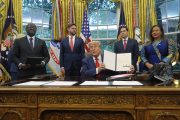
Sotomayor was nominated for the high court on June 1 by President Obama. Since then there has been much focus not just on her Puerto Rican heritage but her judicial philosophy as well. She has made some controversial statements, and one of her most visible decisions, Ricci v. New Haven, Conn., was recently reversed by the very body she aspires to.
Sotomayor, 55, was born in the South Bronx and grew up in public housing. She was able to obtain an Ivy League education and an eventual seat on the U.S. Court of Appeals for the Second Circuit. Since her nomination she has held numerous private meetings with senators working to clarify her views.
Republicans have said they will question her about her views on affirmative action, gun rights, and whether she believes one’s ethnic heritage ought to influence one’s rulings on the high court. Jeff Sessions (R-Ala.) told CBS’s Face the Nation that he was concerned over her possible racial bias. "When you show empathy toward one party," he said, "you show bias toward another."
In other words, Sotomayor has entered the fractious debate over whether the Constitution is color-blind, as Chief Justice John G. Roberts, Jr. believes, or whether it allows government-sponsored preferences based on gender, race, or ethnicity, whether to remedy past discrimination or ensure a more "diverse" work force or student body.
Sotomayor’s most controversial statement to date was made to those assembled for the Mario Z. Olmos Law & Cultural Diversity Memorial Lecture at UC Berkeley back in 2001: "I would hope that a wise Latina woman with the richness of her experiences would more often than not reach a better conclusion than a white male who hasn’t lived that life." This statement struck many observers as appealing to a stereotype that is at best questionable and at worst, racist.
Sotomayor’s stand on affirmative action, in any event, is quite clear: on the court, she would support it. (But then again, so did the departing David Souter, so even if she is confirmed, this would not significantly change the overall ideological composition of the court.)
Another issue on which Sotomayor is likely to be grilled will be gun rights. She was on a three-judge panel in New York earlier this year that held that the Second Amendment does not apply to the states. Sessions has voiced concern over this decision, stating that the panel’s reasoning "would eviscerate the Second Amendment in many parts of the country."
On the other hand, Sotomayor has set herself apart as a defender of free speech. In a 2002 case, she dissented from her two colleagues who upheld the firing of an officer who had sent racist and anti-Semitic mailings to certain charities. Her dissent stated, "To be sure, I find the speech in this case patently offensive. The Court should not, however, gloss over three decades of jurisprudence and the centrality of the First Amendment freedoms in our lives because it is confronted with speech it does not like and because a government employer fears a potential public response that it alone precipitated."
At least one analysis, published by CNN, describes Sotomayor as a "cautious, careful liberal" in the style of Ruth Bader Ginsburg and Stephen Breyer.
Follow the developing story here.




